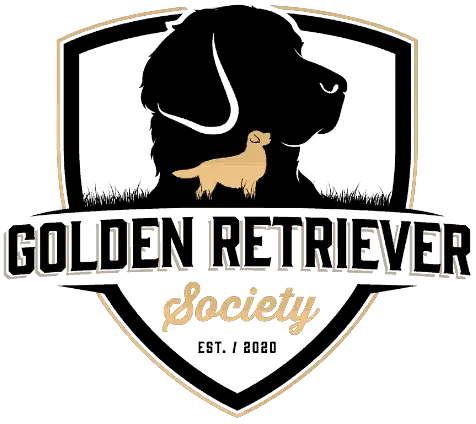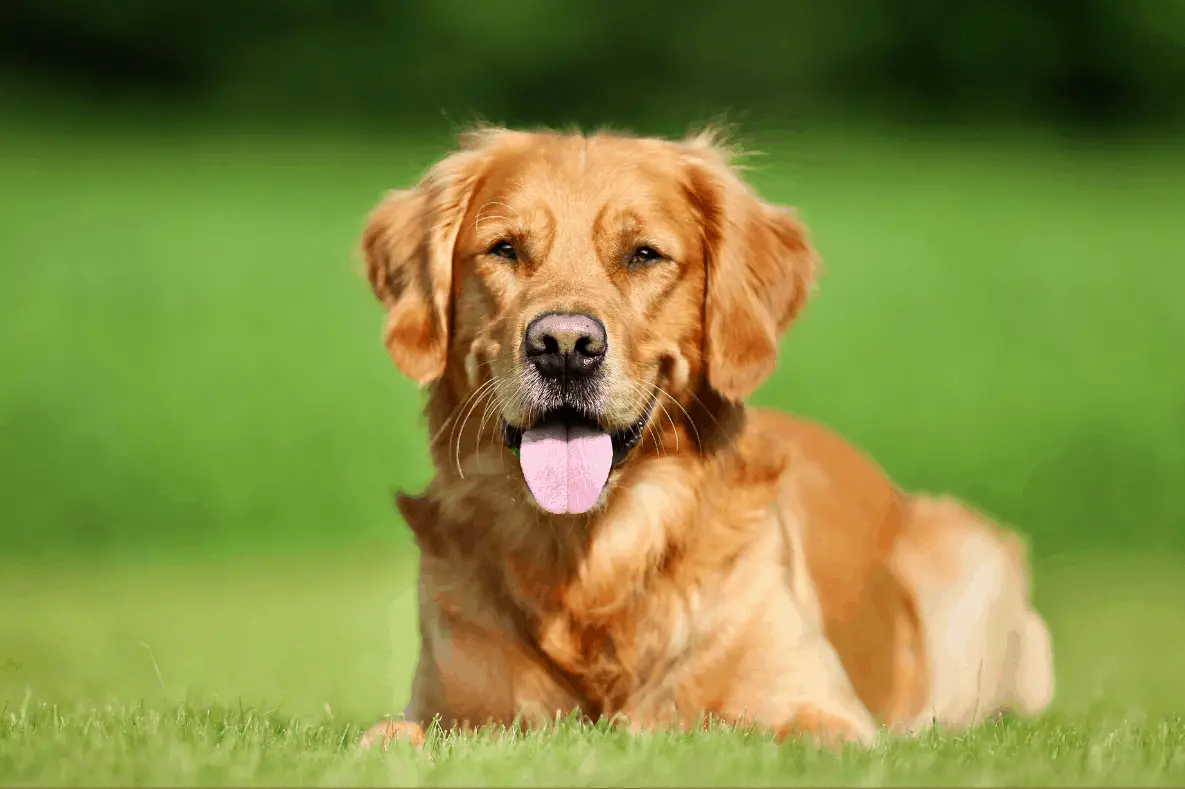Whether you are thinking of becoming the lucky pet parent to a golden retriever, or already have a golden fur baby at home, it’s important to educate yourself and your family on how to train a golden retriever at any age. Not all golden retrievers enter their new families while puppies – some are lucky enough to be rescued in their adolescence, adulthood, or even senior ages.
Table of Contents
How To Train a Golden Retriever
Training a golden retriever is a multi-step process. Start with the basics, such as potty training, leash training, and socialization skills. The training process continues into adolescence and adulthood as you reinforce and refine the skills your retriever learned.
We have created the complete guide on training golden retrievers at any age. We will take you from puppy training, continued adolescent training, and reinforcement training for adult golden retrievers. Along the way, we will teach you the importance of potty training, crate training, socialization, and corrective behaviors (like preventing biting, digging, and chewing on household items.)
We hope our step-by-step approach will make you feel confident in training your pup (which should, in turn, help your puppy trust you and your authority.) With tender love, care, and vigilance, your golden retriever pup will be a well-behaved best friend in no time!
Training: Golden Retriever Puppies
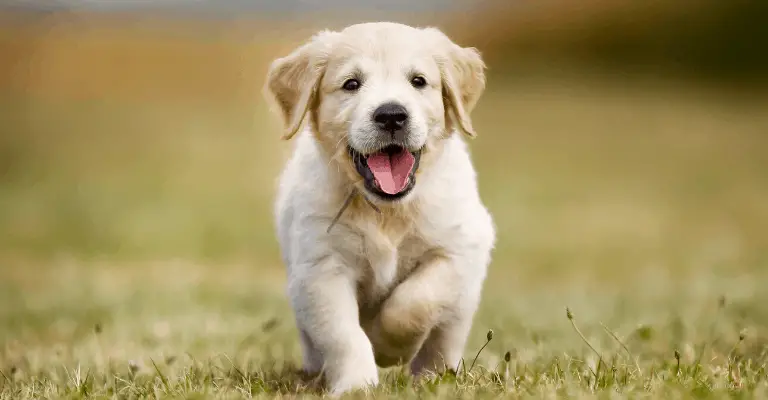
When to Begin Training
Training (hopefully) begins before you even bring your new puppy home. Some breeders start training pups before they find a family. Often this training includes things like mild crate training, mild potty training, and corrective behaviors. Of course, not all breeders do this. Not only that, but many people do not find their goldens via breeders, but rather shelters or rescues.
Regardless, it’s important to note that dogs should not be separated from their mothers or littermates before the ages of 7-8 weeks old. Studies have found this to be damaging to puppy’s psyche and emotional well-being, which can lead to behavioral issues down the road. Therefore, you can expect to begin training as soon as you pick up your 8-week-old golden retriever!
Before the Pup Arrives Home
In a lot of ways, training your Golden Retriever begins before the puppy even arrives home. Dog training demands a tremendous amount of energy and time from both you and your puppy. Not only will you need time, but a few supplies as well.
For this reason, we recommend you have the following supplies ready before your new puppy arrives:
Recommended Supplies
- Crate – Having a crate when your golden retriever first arrives home is crucial, as crate training begins from the first night of sleep onward. It will set you and your puppy’s progress back if they come home and don’t have the crate to get familiar within the first 24 hours.
- Baby Gates – While baby gates are not 100% essential, they certainly are helpful. This prevents your new pup from getting into trouble when you can’t give them your undivided attention to supervise them.
- Indoor Leash – You’ll want a leash that you can use indoors for training purposes.
- Outdoor Leash – Likewise, you will want a leash for outdoors (this one will be shorter than the indoor leash).
- Breeder/Vet Recommended Food – Talk to your breeder, rescue, or veterinarian about the right food to have on hand when your golden retriever puppy arrives home. If your breeder was feeding a brand you and your vet are not keen on, be sure to transition your puppy off its old food. Dogs typically need a 7-day transition from one food to another to prevent tummy issues. Also, this gives you time to monitor for unforeseen allergies.
- Toys – golden retriever pups have a ton of energy! For this reason, be sure to have lots of plushies, chew toys and ropes for them. This will help them acclimate. It will also (hopefully) prevent them from taking an interest in your cute throw pillows or your newly purchased Jimmy Choos.
- Soft Bedding – We recommend placing a warm cozy blanket or dog bed insert into your pup’s crate. Crates are not meant to be a cold and uncomfortable place for your pup. Cozy blankets help!
- Treats – Treats are an essential part of training, so it’s wise to have them on hand before your pup comes home. Keep some in a few key spots in the house to always make sure they are close by when needed.
- Dog Collar – Your new puppy will also require a new flat buckle collar with tags. If you’re a responsible pet parent, then there’s no way your new, vulnerable pup will be allowed outside unsupervised. Nonetheless, getting your golden retriever used to their collar from day one is an excellent idea.
- Dog Brushes – This is a key tool in keeping your Golden’s coat healthy and pretty. There are many different kinds, so make sure you get the right ones.
First Night Home with Puppy
The first night you bring your new golden retriever home will be an exciting and nerve-wracking event for both pup and parent. One of the first things you should do is introduce your new puppy to his or her crate.
Short Crate Training Sessions
Short crate training sessions are one of the most sure-fire ways to get your pup comfortable with its crate. Your golden retriever should feel as though the crate is a home, not a jail.
Small sessions in the crate help to establish this concept with puppies. Let your new puppy explore their crate. Leave the door open while they sniff around. Place their food inside and let them eat in the comfort of this new domain. Then shut the door for 10 minutes. When they are let out, sit with them, play with them, and snuggle with them.
You can reward your golden pup with treats while they are inside the crate, to further establish the crate as a comforting space. No need to reward them after they’re out of the crate as the reward upon leaving is the joy of your company! This also helps to establish your authority and dominance.
For more info on crate training, check out our article How to Crate Train a Golden Retriever.
First Night’s Sleep
Your golden puppy will sleep their first night in the crate they’ve slowly acclimated to all day. Be prepared to hear them wake up in the middle of the night (much like a human infant does.) If you’re lucky, your puppy will only wake you up once or twice.
It is likely when you wake up to take them to go potty outside or to receive a cuddle, that they may have already had an accident inside their crate.
Please be gentle and loving with your new furry friend. This is their very first night in a new home with a new family, away from their mama and siblings they were just torn from. For this reason, do not punish or harshly scold your puppy if they had an accident in the night in their crate. This would be like yelling at a newborn infant for going to the bathroom in their diaper. Not only is this kind of scolding and punishment ineffective, it’s potentially damaging for your relationship with your new golden.
Potty Training
Regretfully, one of the main reasons that dogs are surrendered to local shelters is due to potty training issues. Some pet parents do not have the patience to deal with a dog who struggles in this area. For this reason, it is crucial you spend intentional time potty training your golden retriever from day one.
You must be diligent about this. You will spend the early months of your golden retriever’s life potty training until this is a skill in which they no longer require reinforcing.
If you, your partner, your spouse, or children do not have time to be around all day for the first several weeks to watch your pup and take them outside frequently for potty breaks, then this might not be the best time for you to bring home a golden retriever.
Potty Training Tips
Puppies Have Tiny Bladders
The first thing to note about your golden retriever puppy is that they cannot hold their urine for long. Puppies have small little bladders and need to be taken outside to go potty often. Therefore, you must diligently watch and care for your new golden retriever puppy until they sufficiently ‘get it.’
Take your golden retriever puppy outside frequently
Taking them outside every 30 minutes might be excessive, but bringing them outside every hour isn’t that crazy. In fact, it will help your golden retriever puppy become acquainted with their open-air play space as well as their outdoor bathroom.
Be prepared to take your golden retriever puppy outside every time after they: play, eat, drink, or wake up from a nap.
When to and When Not to Scold/Punish
If your golden retriever pees or poops under your supervision someplace where going to the bathroom is not allowed (inside the home, for example), it is okay to scold them–“No, Ginger, we do not go potty inside!” Then kindly lead your puppy outside where they become familiar with where it is okay to go potty.
Scoop the Poop Outside
We recommend scooping their poops that occur inside the home and place them out in the yard temporarily. This is a common potty-training technique for many animals. Animals remember to go potty where they have marked their territory already. When your golden retriever puppy goes outside next time and smells his or her ‘business’ in the grass, they will automatically begin to associate this outdoor place as their territory and a safe place to “go.”
Clean the Accident Area
When your golden retriever does inevitably have an accident inside the house, it is crucial you clean and disinfect that area thoroughly so that your puppy won’t continue to smell this spot and declare it as ‘marked territory’ by returning to this spot to do their business.
When the accident first occurs, pour a mixture of water and white vinegar on the spot. Other such natural pet cleaners and deodorizers will work well too.
Do Not Reward Potty with Food Treats
Contrary to what most people assume, it is unwise to offer a treat to your dog for going potty outside. The act of ‘release’ that occurs when your dog goes to the bathroom is already a rewarding experience. Not only that, but some dogs are quite savvy and have learned that their owner will give them a treat if they ‘make the attempt’ to go potty.
Some dogs will run outside, squat, never go, and rush over for their treat. To avoid this kind of Pavlov’s dog-gone-wrong scenario, simply reward them with a “good boy!” and some loving scratches behind the ears.
Socialization
Every pet parent wants a dog who is friendly and social, not just to other dogs, but to any and all human visitors. For this reason, teaching your golden retriever how to socialize early on is of paramount importance.
No one wants to own the dog who nips at visitors or cause fights with dogs passing by on the sidewalk. However, this is not simply an innate trait. This behavior is taught and reinforced by their owners.
Studies have proven that puppies have an early developmental period called “the socialization period.” This period is from birth to 3 months of age, where their brains decide what things are good and what things are scary. During this sensitive development phase, it is imperative your puppy be exposed to lots of different stimuli, different people, and other dogs.
However, new puppies cannot go around strangers, other dogs, or play in foreign areas until they’ve received all their vaccinations. So please do not take your 5-week-old puppy to a dog park! It will be unsafe for them to be exposed to those germs. Instead, use this time to expose them to different sounds in the home, objects like vacuum cleaners, visiting friends and family, and other sounds they will need to adjust to.
Acclimating with Other Household Pets
Do not immediately expose your new golden retriever puppy to your other animal companions at home. You need to introduce them to each other slowly. This holds especially true for any particularly rambunxious, aggressive, or territorial animals.
Be sure to survey and be present during these first meet and greets the entire time. Your new golden retriever puppy is vulnerable and could be easily injured by another animal in the home who wishes to show their dominance.
If you have a cat, be sure to check out our article Are Golden Retrievers Good With Cats. We cover all about Golden Retriever and cat companions, and how to introduce them.
Sound Exposure
So that you don’t end up with an easily frightened and skittish pup, it is helpful to expose them to many kinds of sounds. Turn on the vacuum. Then turn it off if they run away scared. Flush toilets in their presence, turn on the shower when they’re in the bathroom, let them get used to the sound of noisy tv shows.
Be cautious not to overdo it. Stimulus is helpful in exposing your puppy to the world. However, too much stimulation can have a negative effect on your dog.
Let them Explore Safely on their Own
If you are vacuuming at home, let your new golden explore this strange foreign object. However, if they are frightened by something, do not force them to engage with it. Instead, pick them up and place them safely away from the object of which they are frightened. Let them return to that object again in their own time to establish courage and reassurance that this object will not harm them.
Do this repeatedly with objects around the home, family members, other pets in the home, etc.
Vigilant Supervision: Behavioral Correction
A new golden retriever pet parent must be prepared to be ever vigilant in watching their new pup like a hawk! If your puppy accidentally pees inside or chews on a household item, you can’t yell or punish your pup if you weren’t supervising them properly. That’s like punishing at a 2-year-old who just burned their hand on the stove-top flames. Yes, inform them that fire is unsafe, and they should never touch the stove when you are not around.
You are the parent, and you are always responsible for their safety and well-being–so that moment is 100% on you. Puppies, in so many ways, are like human children. You would not harm your human child. Therefore, you should not harm your canine child!
Biting & Chewing
Dogs use their teeth for a lot of things. It is a natural canine behavior. However, you don’t want your dog biting your neighbor’s kid or tearing your new comforter to shreds. You need to direct their biting properly, so they know when it is okay, and when it is not okay to chew on something.
To curb their desire to nibble on your favorite shoes, provide your puppy with lots and lots of chew toys. If they start chewing on a household item, redirect them to a chew toy.
Puppies are also capable of adjusting their bite pressure. If your golden retriever puppy has not yet learned what hurts you and what does not, you will need to yelp (loudly) like an injured dog to let them know. Yes. Yelp.
Will this feel ridiculous? ABSOLUTELY! Is it effective? YES. Your puppy does not want to injure you, and by yelping loudly if they bite down too hard, you are letting them know that something has harmed you. Often a loud yelping of this nature will startle your pup, and they will release their grasp instantly. As with all things in puppy training, repeat, repeat, repeat.
Name Reward
Another important task for any pet parent is getting their new golden retriever acquainted with their name. A great and effortless way to do this is to say their name and offer up a treat. Do this again and again. Your golden retriever puppy should have a positive association with their name and want to come running to you when they hear it!
Leash Training
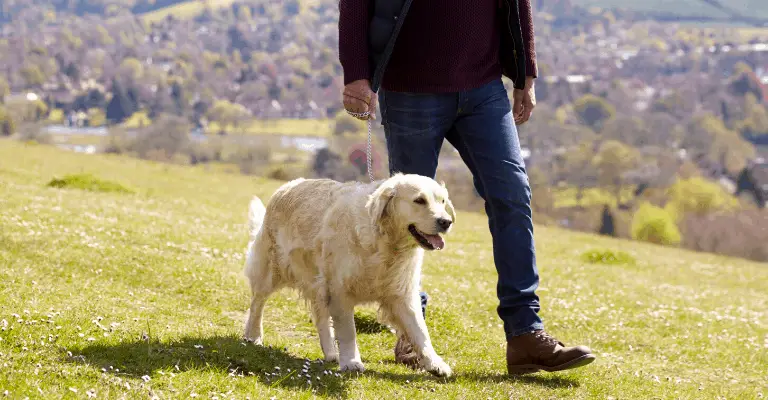
Next to potty training and socializing, leash training may be one of the most important and more challenging skills to teach your golden retriever pup. Both you and your golden should have a pleasurable experience when out for a walk, and as such, leash training should be an utmost priority.
A wonderful way to introduce a leash to your dog is to allow them to sniff and nibble the leash. Much like human babies who initially test most objects out by shoving it in their mouths, your dog learns what things are in a comparable way. Let them meet and get comfortable with a leash before you attach it to their collar.
Be prepared for your pup to be a bit over-stimulated on their first few walks. They will hear new sounds, smell all kinds of new smells, and encounter strangers (both human and canine).
Note: you do not need treats to leash train. The walk itself is a reward. Treats can be helpful, but they can also set up a precedent that requires you to always walk with treats.
Leash Training Tips
- Put the leash on your dog’s collar, lead them out on a walk. Pick a marker word to reinforce behavior. “Steady,” “slow,” or “heel” are good options.
- When your pup races ahead of you, shout your command word: “Bentley, HEEL!”
- Do not yank hard on the leash. You do not want to choke or harm your golden retriever. Simply tug back gently and pause for them to come back to your side. Once they have settled back in place, you may proceed forward again.
- You will continue to reinforce this behavior using your command word, pausing when they start to get too excited and race ahead of you and only proceeding with the walk again once they have calmed down and followed your command.
- Repeat this, repeatedly, until your pup starts to get it.
- It is best to do this in short walks (5-10 min), 3-5x a day. Once your pup seems to get it, you can begin doing less walks for longer periods of time (ex: 2 walks for 30 min a day.)
Continued Training: Adolescent Golden Retrievers
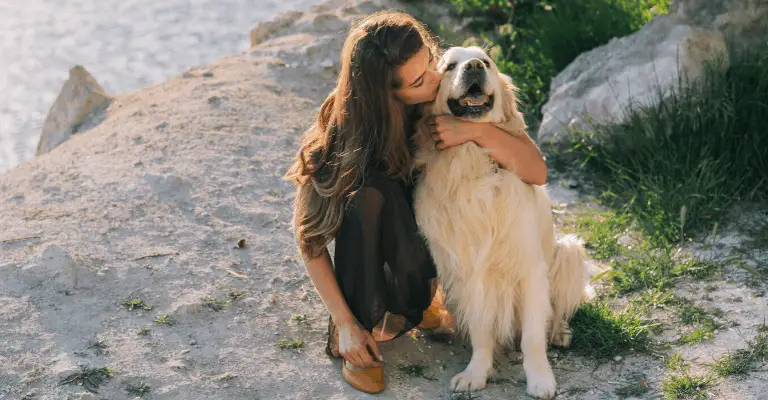
After one year, your golden retriever is technically no longer a puppy. They remain in their adolescence from about 1-3 years old. Sometimes during this period, even after a puppy has been very successfully trained, adolescent dogs might regress in their training. Dogs, like humans, like to test their boundaries. The best way to set a boundary…is to keep setting it without wavering.
This training at this age is also important to follow in the event you adopt a golden retriever in their adolescence (as opposed to when they are a puppy.)
Reinforce Commands
If you are trying to get your dog to come, but they refuse, continue to command that they come until they do. Do not relent. If you relent, they will learn that you are not in charge and that they can do whatever they like.
Re-Socialize
Much like awkward pre-teens going through puberty, adolescent dogs can behave differently around other animals or strangers suddenly. When this occurs, don’t panic. Your dog is not suddenly and forever an ‘unfriendly dog.’ They just need to re-socialize.
The best way to re-socialize your golden retriever puppy is to give them positive socializing time. If you know there is a dog they just adore, set up play dates with that dog. If you haven’t had as much time to play and bond with your dog lately, be sure to be intentional about that time. Positive playtime and snuggles from their family are one of the best ways to get behavior back on track.
Change Your Behavior
Many times, we can end up scolding or punishing our dog for something we’ve done wrong. If your dog is behaving strangely around you, try to recall your recent behavior. Have you been stressed? Have you spent less time recently with your golden, or have you accidentally scolded them too many times? Dogs are sensitive to their owner’s vibes.
It’s how dogs somehow just ‘know’ when their owners are going on vacation. They can sense it. Dogs, likewise, can sense when you are stressed, angry, or sad. Make sure that your personal behavior hasn’t changed before you go getting angry at your adolescent pup who is worried about you and their changing household environment.
Reinforcement Training: Adult Golden Retrievers

It’s possible your adult golden retriever has regressed on some of their skills, or you’ve adopted an adult dog who was not so professionally trained and needs some assistance.
Reinforcement Training Tips
Difficulty Walking On Leash
Some Goldens either never really got the hang of leash training, weren’t ever trained, or have regressed due to poor reinforcement. Either way, it’s important to correct this behavior as soon as possible. While on a walk, if your pup goes wild, stop.
Wait until your pup calms down. Once they do, continue the walk. You will literally repeat this repeatedly. Granted, you’ll need ample amounts of time to make this successful. Try walking three times a day this way for a few weeks to see if the behavior improves.
Loud and Incessant Barking
We do not recommend using bark collars. A dog barks for specific reasons that come naturally for a canine. It is unfair to punish them for an instinct to protect, defend, or inform.
A better way to combat loud, incessant barking, is to be a bit like a detective and track what/when/why your dog barks. Does your dog only bark when the neighbor dog approaches your property line? If so, your dog is likely frightened or feeling defensive. Before you can tackle a change in behavior, you must first understand why the behavior is occurring.
Potty Training Regression
As we mentioned before, often certain behaviors reflect our own behaviors. A common amount of potty training regressionary behaviors occur due to human pet parents not being around as often as they should, or not playing/giving enough attention.
If your dog begins going potty inside all of a sudden, it usually indicates one of three things: a health issue (like urinary stones), they were locked inside alone for too long (their poor bladder couldn’t hold it any longer), or they are upset with you. Emotional peeing is a common occurrence in both dogs and cats and is rather effective since humans tend to pay more attention to their animal that emotionally pees on their valuables when that animal is feeling neglected.
Using Additional Tools During Golden Retriever Training
Training tools and equipment can be helpful in making training your Golden Retriever easier and more effective. There are many tools and equipment available, including leashes, collars, clickers, and treats. A leash and collar are essential for controlling your dog during walks and training sessions, while a clicker can be used to mark and reward good behavior. Treats can also be used as a reward for good behavior, but it’s important to use them sparingly and choose healthy options.
When to Get Help from Professional Dog Trainers
Sometimes, despite your best efforts, you may find that you’re not making progress with your Golden Retriever’s training. This is when it may be time to seek professional help from a dog trainer or behaviorist. A professional can help identify problem behaviors and develop a customized training plan that works for your Golden Retriever’s needs. Additionally, a professional can provide guidance on specific issues such as separation anxiety, leash pulling, or aggression. It’s important to choose a reputable professional who uses positive reinforcement techniques and has experience working with Golden Retrievers specifically. Getting help from a professional can be a game-changer for both you and your furry friend and can lead to a happier and more fulfilling relationship.
Conclusion
Training your golden retriever, no matter what age, should be a fun task. At times, it may prove challenging, but golden retrievers are a breed of dog known for their loving nature and willingness to please.
If you are diligent with reinforcing behavior, give plenty of loving time to your pet, and follow all these simple instructions, then training your new family member should be fast, fun, and effortless.
While training your Golden, be sure to keep them feed well. View our Recommended Feeding Chart as well as our Recommended Foods for Goldens.
